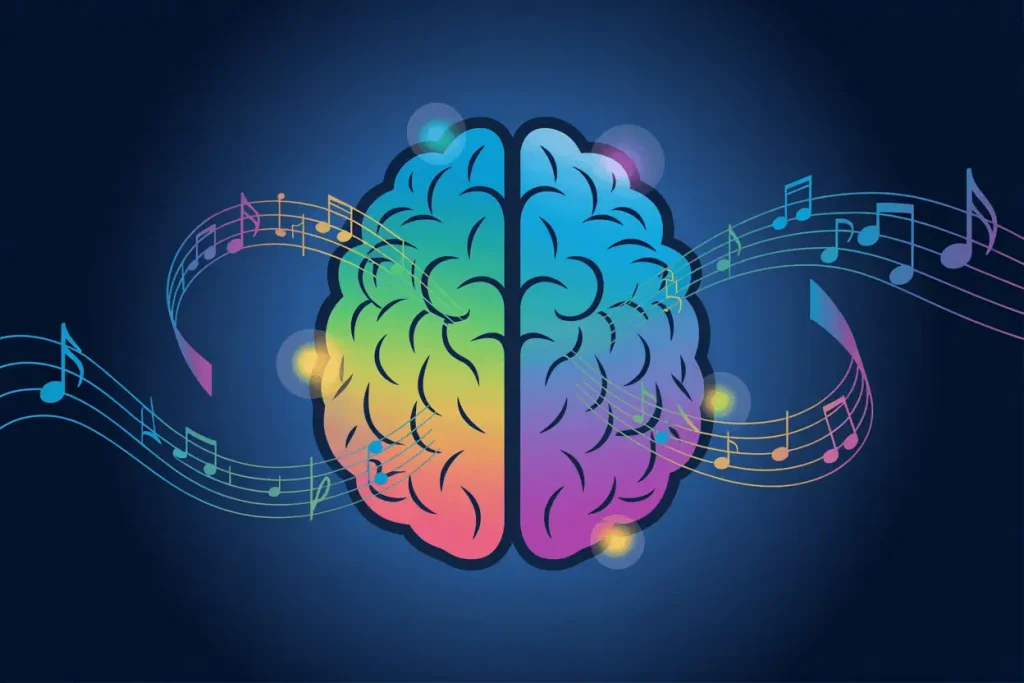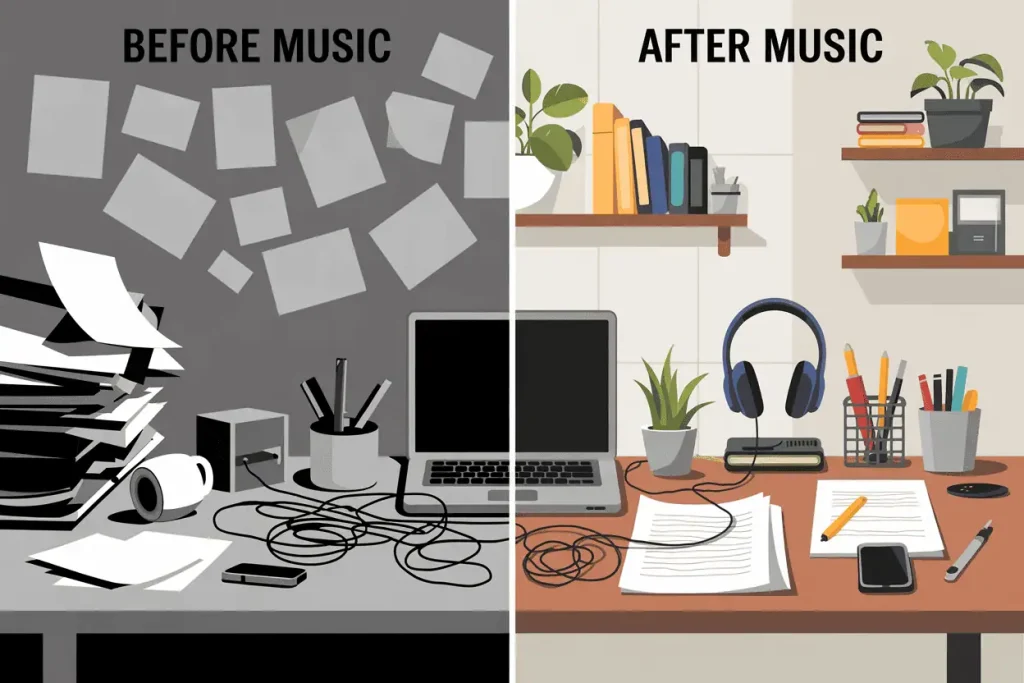Tune In, Zone Out: Music for Concentration & Productivity at Work
Finding focus at home can be hard. One simple tool can help: music. The right sounds can turn your home office into a place where you get things done.
Table of Contents
Finding Your Focus Soundtrack in the Home Office
Working from home gives you freedom but brings new problems. Without an office setting, it’s easy to lose focus with all the distractions at home. When your living room becomes your workspace, staying in “work mode” gets tricky.
Music can help solve this problem. The right sounds do more than block noise. They can boost how well your brain works and help you get more done from home.
How Music Affects Your Brain and Focus
Music changes how your brain works in ways that can help you focus better.

Brain Science Basics
When you listen to music, many parts of your brain light up at once. Areas for feelings, memory, and focus all work together. This brain activity can improve how well you think and work.
Music can even change your brain waves. Your brain makes different wave patterns based on what you’re doing:
- Beta waves: Active thinking
- Alpha waves: Calm focus
- Theta waves: Dreamy, creative states
- Delta waves: Deep sleep
Some music can help shift your brain toward alpha and beta waves – the ones best for focused work.
Chemical Changes
Music also causes your body to release chemicals:
- Dopamine: Makes you feel good and more driven
- Cortisol: A stress hormone that calm music can reduce
These changes create better inner conditions for focused work without you even noticing.
The Truth About Music and Smarts
The famous “Mozart Effect” (y’know, the idea that classical music makes you smarter) isn’t quite right. But music does help your brain in real ways:
- It improves your mood
- It reduces stress
- It helps create good conditions for deep focus
These benefits are real and can make your workday better.
Types of Music and Sounds for Better Work
Different sounds help with different types of work.

Here’s what you can try:
Music Without Words
Songs with words can fight for your brain’s attention when you’re trying to read or write. Music without words solves this problem.
Classical Music The steady beat of classical music (about 60 beats per minute, like your heart rate) creates a good setting for focus. Bach and Mozart work well because their music is clean and precise.
Lo-fi Hip Hop This type of music has become popular for good reason. Its soft, repeating beats create a pattern your brain can easily tune out. The gentle sound can make you feel good while keeping you relaxed enough to focus for long periods.
Ambient Music With its gentle tones and few changes, ambient music is great at masking noise without grabbing your attention. Brian Eno created this style to enhance spaces without taking over.
Electronic Music (No Words) For data work or tasks you repeat often, the upbeat rhythms of electronic music can give you energy. Services like Brain.fm offer electronic music made just for focus.
Nature Sounds
Sounds like rain, lake noises, ocean waves, or forest sounds can mask noise while helping you feel calm.

These sounds turn on your body’s rest system, cutting stress and creating good conditions for steady focus.
White Noise and Other Options
Sometimes, the best sound isn’t music at all:
White Noise This steady, even sound masks many types of noise by creating a blank sound wall.
Pink and Brown Noise These are softer versions of white noise. Pink noise has more low sounds, and brown noise has even more. Many people find these easier to listen to for long periods.
Special Sound Patterns Some audio tracks use special sound patterns to encourage certain brain states. While studies are still ongoing, many users say these help them focus better.
Music for Deep Focus
The state of being fully lost in your work can sometimes be helped by music with these traits:
- No words
- Steady rhythm
- Calm feeling
Good types include ambient music, post-rock, lo-fi hip hop, and soft background music.
Quick Guide: Matching Music to Your Task
| Task Type | Best Sound | Why It Works |
|---|---|---|
| Writing/Reading | Classical, Ambient | Few changes, steady pace |
| Data Work | Lo-fi, Electronic | Good beat for repeat tasks |
| Creative Work | Nature sounds, Lo-fi | Relaxes mind for new ideas |
| Learning New Things | Silence or very soft sound | Less for your brain to handle |
| Admin Tasks | Upbeat instrumental | Gives energy for routine work |
Tips for Using Music Well
Finding your perfect work music takes some testing and knowing how different sounds affect you.

Try Different Things
Everyone responds differently to various sounds. Pay attention to how you feel and work with different music. What helps you think deeply might not work for simple tasks.
Find the Right Speed
Music between 50-80 beats per minute usually works best for calm focus. Slower beats tend to help with creative and complex thinking. Slightly faster beats can energize you for routine work.
Set the Right Volume
Keep the volume medium—loud enough to mask noise but not so loud it becomes a problem. You should be able to talk without raising your voice if needed.
Headphones or Speakers?
Noise-canceling headphones block out the most noise, creating a bubble of focus.

Speakers give a more open feel that some people prefer for long work sessions.
Plan Your Music Use
Think about how music fits into your work:
- Start hard tasks in silence to get your bearings
- Use music during the main work phase
- Make playlists for different types of work
- Use music changes to signal breaks
Make Your Own Playlists
Task-specific playlists save you from making too many choices. They help train your brain to link certain sounds with certain types of focus. Try sorting playlists by:
- Energy needed
- Type of task
- Time of day
- How long you’ll work
Notes for People with ADHD
For those with ADHD or other focus challenges, the right music can be extra helpful. Many with ADHD find that steady, rhythmic music provides the stimulation their brains need, helping them focus better on main tasks.
When Quiet Is Best
Despite the benefits music can offer, sometimes silence truly works best. Watch out for these music pitfalls:
Possible Focus Killers
Music can hurt your focus when it:
- Has words (especially in your main language)
- Has complex patterns or sudden changes
- Is very familiar (triggering memories)
- Stirs strong feelings
- Plays too loud or fast
Brain Space Limits
Your working memory can only hold so much. For very complex tasks that need lots of brain power, even music without words might compete for those resources.
Personal Differences
Not everyone works well with background music. Factors that might make quiet better include:
- Your personality (especially if you’re more introverted)
- How complex your task is
- Your learning and working style
- How sensitive you are to sounds
Finding What Works For You
The best sound setting for good work varies from person to person. What energizes one person might distract another. The key is testing and knowing yourself.
As you work from home, take time to find your perfect “focus soundtrack.” Notice how different sounds affect your mood, energy, and output.
The right mix of music, nature sounds, or even quiet can make your home workspace a place where you get lots done.
By matching your sound setting to your brain’s needs, you’ll not only get more done but also enjoy your workday more—a win for anyone working from home.



